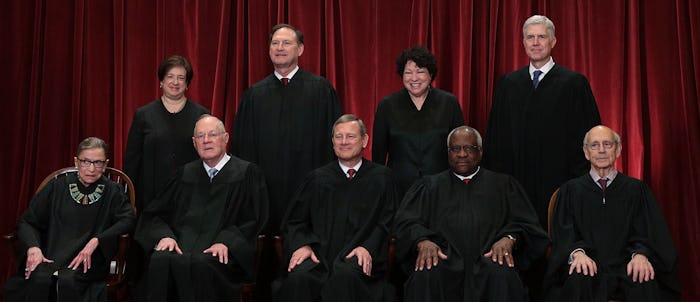News

Will The Supreme Court Hear The Travel Ban Case?
According to the New York Times, the United States Justice Department filed a petition asking for review of a decision by the United States Court of Appeals for the Fourth Circuit, in Richmond, Virginia, which blocked the Trump administration’s "travel ban," — the administration's proposed temporary limits on travel from six majority-Muslim countries. Will the Supreme Court hear the travel ban case? That remains to be seen, but the country's highest Court does have some options.
The Times reported that the petition had three urgent requests from the Department of Justice. Apparently, one of those was a request for the judges "to act a little faster than usual," and asked them to decide whether they will hear the case before they depart for their planned summer break.
The other requests ask the court to stay two rulings blocking parts of the travel ban. If the stays are granted, that would put the ban back into effect while the justices decide how to respond to the Department's petition. The Times reported that it takes five votes to grant such a stay.
Slate reported that those two rulings involved the barring of entry by individuals from six mostly Muslim countries, and the other involved the suspension of the refugee program, "then halving the number of refugees admitted to the U.S."
Mark Joseph Stern at Slate pointed out that if the court’s five conservative justices think the ban is constitutional, "they can act quickly to let the order take full effect." However, if even one conservative has an issue with the ban, the court can keep it in limbo.
Reuters reported that the nine justices will have to decide whether Trump's troubling election campaign rhetoric can be used as evidence that the order had the intent to discriminate against Muslims. The countries included in the order are Iran, Libya, Somalia, Sudan, Syria and Yemen, which have majority-Muslim populations.
But according to the New York Times, it wasn't an outright ban at all, merely a "brief pause" on allowing individuals from those countries into the United States. The petition reportedly stated:
The stakes are indisputably high: The court of appeals concluded that the president acted in bad faith with religious animus when, after consulting with three members of his cabinet, he placed a brief pause on entry from six countries that present heightened risks of terrorism.
The beginning of that statement isn't wrong. The stakes are incredibly high — but many would argue that they're higher for people like refugees trying to escape war-torn and otherwise unstable regions.
The Times reported that the Supreme Court will likely agree to hear the appeal. Reuters agreed, and stated that "the Supreme Court is not required to hear the case but is likely to due to its importance." Plus, the fact that it was the government that made the request makes it extremely significant, and odds are the court will understand the importance of the review.
Four votes are required to hear a case, but five are needed to stay an injunction by a lower court. Slate reported that the outcome will likely rest with Justice Anthony Kennedy, considered the "swing vote" on the court. "It is impossible to say with certainty which way he’ll swing," Stern wrote.
According to CBS News, legal arguments about whether the policy violates federal law or the Constitution could be filed over the summer, with the justices hearing the case as early as fall, if the schedule proposed by the administration Thursday is followed.
And the Times reported that whenever a major presidential initiative, such as an executive order, is ruled unconstitutional by a federal appeals court, it's rare that a review by the Supreme Court doesn't follow. But the question of a stay may be more complicated. According to the Times, the Supreme Court "typically moves quickly on requests for stays, often acting in about a week."
So in any case, we should know soon whether the Supreme Court will hear the travel ban case, for better or worse.